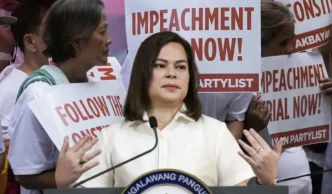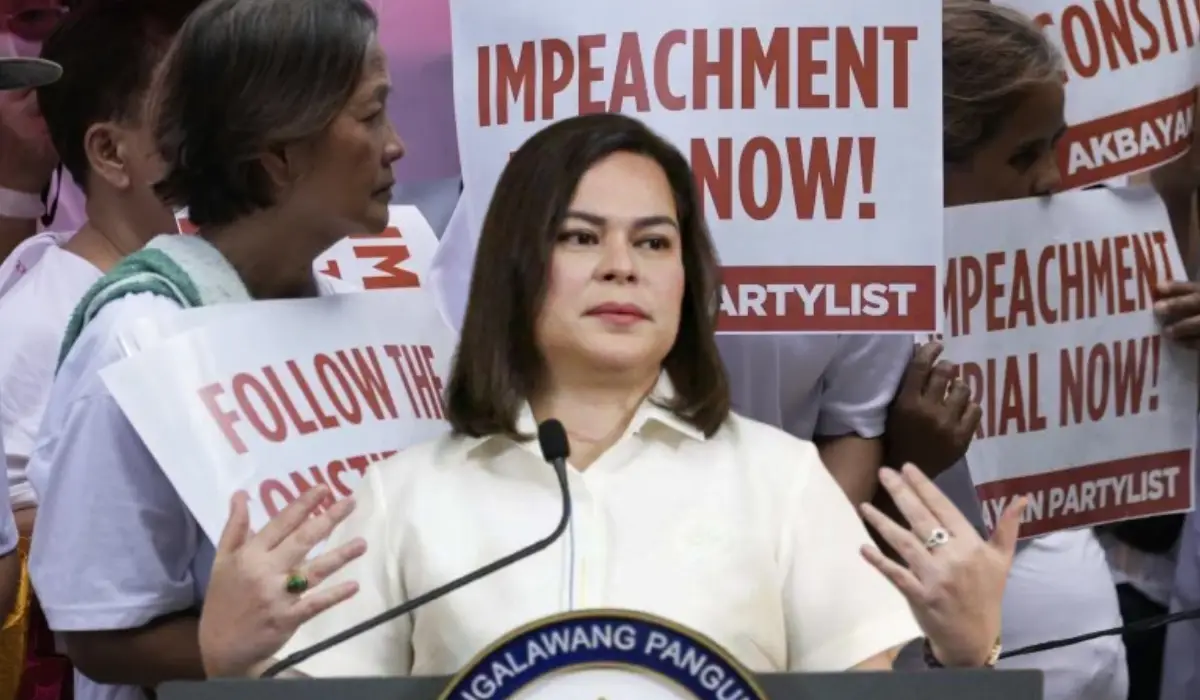In a significant development in Manila, the Philippine Senate, sitting as an impeachment court, voted on June 10, 2025, to return the articles of impeachment against Vice President Sara Duterte to the House of Representatives. The decision, passed by a margin of 18-5 with no abstentions, does not dismiss the case but raises critical questions about procedural integrity and constitutional compliance. This move has intensified an already fraught political atmosphere, as the nation grapples with allegations against one of its highest-ranking officials.
Procedural Maneuver Sparks Debate
The Senate’s decision followed hours of intense deliberation over a motion initially proposed by Senator Ronald “Bato” dela Rosa to dismiss the impeachment proceedings outright. Dela Rosa argued that the case suffered from “constitutional infirmities” and questioned the jurisdiction and authority of the 20th Congress over the matter. “I respectfully move that, in view of its constitutional infirmities and question on the jurisdiction and authority of the 20th Congress, the verified impeachment complaint against Vice President Sara Zimmerman Duterte be dismissed” he stated during the session.
However, the discourse shifted when Senator Bong Go introduced an alternative approach, advocating for a careful examination of unresolved questions surrounding the case. “We want the outcome of this investigation to be justice, not politics. We would only achieve this if we get answers, that’s why we need to study this carefully. We should not let this sit too long, but we should also not expedite it” Go urged his colleagues. He further suggested, “At the very least, we need to study it. Maybe we can return or remand it.”
Taking cue from Go’s remarks, Senator Alan Peter Cayetano proposed an amendment to Dela Rosa’s motion. Instead of an outright dismissal, Cayetano argued for returning the articles to the House for further clarification. “Why will remanding be in the interest of justice and consistent with our oath of political neutrality? Because if this happens, the articles of impeachment will be brought back to the House. We will ask them to certify that they did not violate the one impeachment per year rule” he explained. Cayetano’s motion ultimately gained traction, with Dela Rosa agreeing to the amendment, leading to the decisive 18-5 vote.
Senate Vote Reveals Divisions
The voting breakdown highlighted deep divisions within the Senate. Eighteen senators, including Cayetano, Dela Rosa, Bong Revilla, Imee Marcos, and Senate President Chiz Escudero, supported the motion to remand the articles. Opposing the decision were five senators from the minority bloc: Aquilino “Koko” Pimentel, Risa Hontiveros, Nancy Binay, Grace Poe, and Sherwin Gatchalian. Their dissent underscores a broader tension between procedural fidelity and the urgency to address allegations against Duterte, which reportedly include charges of perjury and corruption.
The decision to return the articles to the House is seen by some as a strategic compromise, avoiding a direct dismissal while signaling concerns over the impeachment process’s legitimacy. Cayetano emphasized that the move would allow the House to affirm its commitment to constitutional limits, such as the rule prohibiting multiple impeachment complaints against the same official within a single year. He also noted that prosecutors from the 20th Congress would have the opportunity to clarify their intent to pursue the case, potentially involving the 12 senators who have joined the current Congress in determining the next steps.
Constitutional Questions and Political Implications
At the heart of the Senate’s deliberations are unresolved questions about the House of Representatives’ handling of the impeachment complaints. Dela Rosa accused the lower chamber of circumventing constitutional rules by allegedly delaying action on three earlier complaints filed against Duterte in December 2024. If confirmed, such inaction could undermine the legal basis for the current proceedings, raising doubts about whether the House adhered to the one-year limit on impeachment filings.
The return of the articles to the House does not equate to a termination of the case, as Cayetano clarified, but it places the onus on the lower chamber to address these procedural concerns. Legal experts suggest that this move could delay the trial, potentially extending it into the next Congress, as hinted by President Ferdinand Marcos Jr. in recent statements. Marcos has publicly acknowledged the possibility of the impeachment process “crossing into the next Congress” due to time constraints, a scenario that could further complicate the political landscape.
For Vice President Duterte, the daughter of former President Rodrigo Duterte, the impeachment proceedings represent a significant challenge to her political standing. As a key figure in the country’s leadership, her tenure has been marked by both staunch support and intense scrutiny. Allegations of perjury and corruption, though not yet substantiated in court, have fueled public and political debate about accountability at the highest levels of government. The outcome of this process could set a precedent for how impeachment cases are handled in the Philippines, particularly in an era of heightened political polarization.
Public Reaction and Broader Context
Public sentiment on the impeachment saga remains divided, reflecting the broader polarization in Philippine politics. Supporters of Duterte argue that the proceedings are politically motivated, pointing to her family’s longstanding influence and the contentious history of her father’s presidency. Critics, however, see the allegations as a necessary test of accountability, emphasizing the importance of transparency in governance.
On social media platforms like X, reactions range from calls for swift justice to accusations of political vendetta. While these sentiments provide a glimpse into public opinion, they also highlight the challenge of separating fact from speculation in a highly charged environment. The Senate’s decision to remand the articles, rather than dismiss them outright, may be seen as an attempt to balance these competing narratives, though it risks prolonging uncertainty.
The impeachment process also unfolds against a backdrop of broader governance challenges in the Philippines, including economic recovery efforts and ongoing security concerns in various regions. As the second-highest official in the land, Duterte’s role in addressing these issues is significant, and any disruption to her office could have ripple effects on national policy. Analysts note that the outcome of this case may influence public trust in democratic institutions, particularly if procedural delays or perceived biases shape perceptions of fairness.
Historical Precedent and Legal Framework
Impeachment in the Philippines is governed by strict constitutional provisions, designed to ensure that such proceedings are not abused for political gain. The 1987 Constitution stipulates that the House of Representatives has the exclusive power to initiate impeachment cases, while the Senate serves as the trial court. A two-thirds vote in the Senate is required for conviction, a high threshold that underscores the gravity of removing a public official from office.
Historically, the Philippines has seen several high-profile impeachment cases, most notably that of former President Joseph Estrada in 2001, which culminated in his removal from office following a popular uprising known as EDSA II. More recently, the 2012 impeachment of Chief Justice Renato Corona marked another significant moment, highlighting the judiciary’s vulnerability to political pressures. These cases serve as reminders of the delicate balance between accountability and the risk of politicization in impeachment proceedings.
In Duterte’s case, the procedural complexities surrounding the House’s actions add an additional layer of uncertainty. If the one-year rule on impeachment filings is found to have been violated, it could invalidate the current complaint, potentially derailing the process. Alternatively, a certification from the House affirming compliance could pave the way for a full trial in the Senate, setting the stage for a historic reckoning.
Looking Ahead: Unresolved Questions
As the impeachment articles return to the House of Representatives, the path forward remains unclear. Will the lower chamber address the procedural concerns raised by the Senate, or will further delays exacerbate tensions? How will Vice President Duterte and her allies respond to this latest development, and what impact might it have on her political future?
Beyond the immediate case, the episode raises broader questions about the state of democratic governance in the Philippines. The interplay between constitutional rules and political realities continues to test the resilience of the country’s institutions, with implications for public trust and stability. As the nation watches this unfolding drama, the pursuit of justice—rather than politics, as Senator Go emphasized—remains the ultimate goal, though achieving it may prove to be a formidable challenge.
















